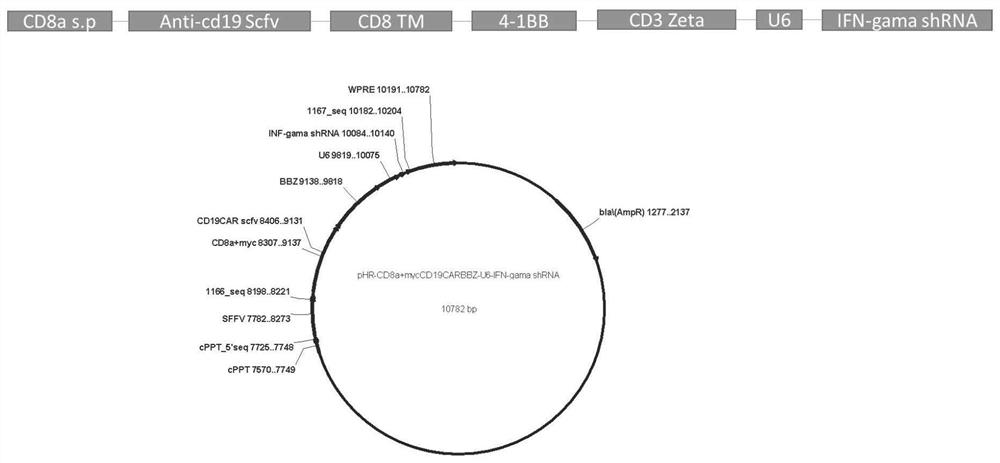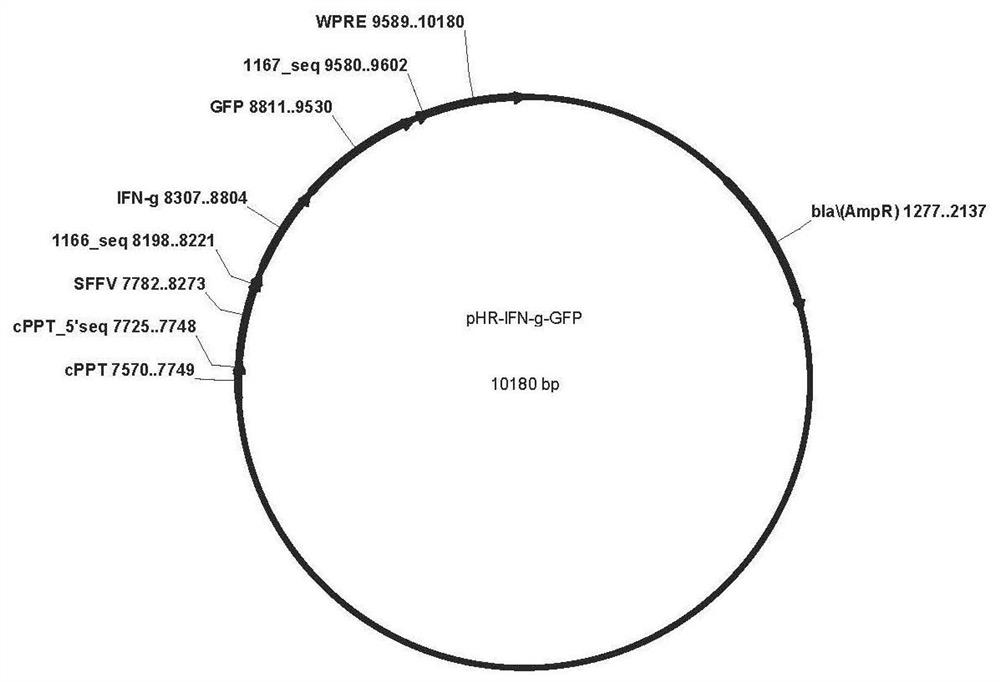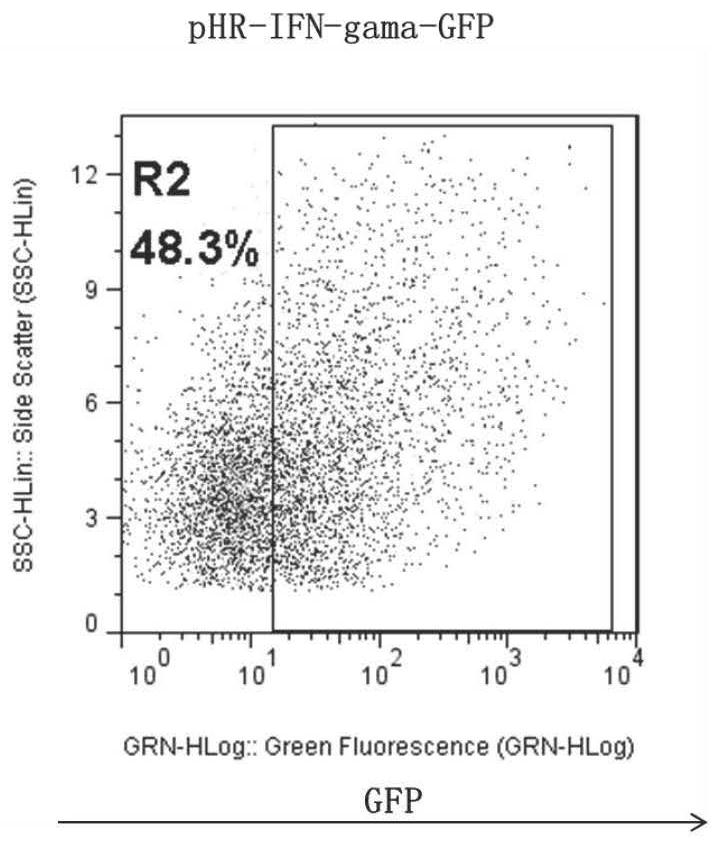CD19-car-t cell interfering with ifn-gama expression and its application
A gene expression and expression vector technology, applied in the fields of genetic engineering and cell biology, can solve the problems of patient death, interference with target gene expression, and short duration of interference
- Summary
- Abstract
- Description
- Claims
- Application Information
AI Technical Summary
Problems solved by technology
Method used
Image
Examples
Embodiment 1
[0094] Example 1: Synthesis of IFN-gama shRNA capable of being cloned into a vector
[0095] Check the sequence of IFN-gama shRNA on the official website of Sigma-Aldrich China, and select four of them (gama-1, gama-2, gama-3, gama-4), and their nucleotide sequences are shown below.
[0096] gama-1: CCGG GCAGAGCCAAATTGTCTCCTT CTCGAGAAGGAGACAATTTGGCTCTGCTTTTTG.
[0097] gama-2: CCGG TATAAGTGAAGTGATACTATC CTCGAGGATAGTATCACTTCACTTATATTTTG.
[0098] gama-3: CCGG CATTCAGATGTAGCGGATAAT CTCGAGATTATCCGCTACATCTGAATGTTTTTTG.
[0099] gama-4: CCGG GGTTGTCCTGCCTGCAATATT CTCGAGAATATTGCAGGCAGGACAACCTTTTTG.
[0100] Wherein, the underlined sequence is the sequence of siRNA in each.
[0101] The present invention adopts the traditional method of cloning into the vector, and inserts two DNA oligonucleotides encoding the IFN-gamasiRNA sequence into the vector. The DNA oligonucleotide contains a 21-nucleotide long sense siRNA sequence, connected to its reverse complementary antisense...
Embodiment 2
[0119] Example 2: Construction of IFN-gama shRNA and CD19CAR dual expression vector
[0120] Such as figure 1 As shown, CD8 transmembrane signal peptide, myc tag, anti-CD19Scfv, CD8 transmembrane region, 4-1BB co-stimulatory signal region and CD3ZetaTCR activation region, U6 promoter, IFN-gama shRNA were sequentially cloned into the lentiviral backbone plasmid In pHR, the pHR-antiCD19CAR-U6-IFN-gama shRNA plasmid was obtained (there are four kinds of IFN-gama shRNA involved in the experiment, so there are also four kinds of plasmids obtained, respectively as follows).
[0121] The nucleotide sequence of CD8amyc-anti-CD19Scfv-CD8TM-4-1BB-CD3Zeta-U6-IFN-gama shRNA-1 is shown below (shown as SEQ ID NO: 13).
[0122] SEQ ID NO: 13:
[0123] ATGGCCTTACCAGTGACCGCCTTGCTCCTGCCGCTGGCCTTGCTGCTCCACGCCGCCAGGCCGGAGCAGAAGCTGATCAGCGAGGAGGACCTGACTAGTGACATCCAGATGACACAGACTACATCCTCCCTGTCTGCCTCTCTGGGAGACAGAGTCACCATCAGTTGCAGGGCAAGTCAGGACATTAGTAAATATTTAAATTGGTATCAGCAGAAACCAGATGGAACTGTTAAACTCCTGAT...
Embodiment 3
[0131] Example 3: Preparation of pHR-IFN-gama-GFP screening plasmid
[0132] Such as figure 2 As shown, IFN-gama and GFP were sequentially cloned into the lentiviral backbone plasmid pHR to obtain the pHR-IFN-gama-GFP plasmid. GFP in the pHR-IFN-gama-GFP is a reporter gene, which is used to detect the gene silencing efficiency of IFN-gama.
[0133] The nucleotide sequence of the IFN-gama-GFP fusion protein is as follows:
[0134] ATGAAGTACACCAGCTACATCCTGGCCTTTCAGCTGTGCATCGTGCTGGGCAGCCTGGGCTGCTACTGCCAGGACCCCTACGTGAAGGAGGCCGAGAACCTGAAGAAGTACTTCAACGCCGGCCACAGCGACGTGGCCGACAACGGCACCCTGTTCCTCGGCATCCTGAAGAACTGGAAGGAGGAGAGCGACAGGAAGATCATGCAGTCCCAGATCGTGAGCTTCTACTTCAAGCTGTTCAAGAATTTCAAGGACGACCAGAGCATCCAGAAGAGCGTGGAGACCATCAAGGAGGACATGAACGTGAAGTTTTTCAATAGCAACAAGAAGAAGAGGGACGACTTCGAGAAGCTGACCAACTACAGCGTGACCGACCTGAATGTGCAGAGGAAGGCCATCCACGAACTGATCCAGGTGATGGCCGAGCTGAGCCCTGCCGCCAAGACCGGCAAGAGGAAGAGGAGCCAGATGCTGTTCAGGGGCAGGAGGGCCAGCCAGGGATCCATGGTGAGCAAGGGCGAGGAGCTGTTCACCGGGGTGGTGCCCATCCTGGTC...
PUM
 Login to View More
Login to View More Abstract
Description
Claims
Application Information
 Login to View More
Login to View More - R&D
- Intellectual Property
- Life Sciences
- Materials
- Tech Scout
- Unparalleled Data Quality
- Higher Quality Content
- 60% Fewer Hallucinations
Browse by: Latest US Patents, China's latest patents, Technical Efficacy Thesaurus, Application Domain, Technology Topic, Popular Technical Reports.
© 2025 PatSnap. All rights reserved.Legal|Privacy policy|Modern Slavery Act Transparency Statement|Sitemap|About US| Contact US: help@patsnap.com



